

Learned Optimism: Is Martin Seligman’s Glass Half Full? Can you learn to have a positive outlook?

And if you could…how would that change your life? Learned Optimism is a concept from Positive Psychology’s founding father, Martin Seligman, which argues that we can cultivate a positive perspective. With a more joyful outlook on life, he explains that we’re in a much better position to enhance our well-being. This article is about the Learned Optimism concept and its benefits, as well as how you can start to change your mindset and life. If you’d love to lead a life from a ‘glass half full with a splash of ice’ perspective, then read on to learn more.
What is Learned Optimism in Psychology? Put succinctly, Learned Optimism is a concept that says we can change our attitude and behaviors – by recognizing and challenging our negative self-talk, among other things. A Little Background Benefits Found in Research Before examining the findings on optimism’s benefits, let’s consider exactly what the two entail. A few benefits of optimism include: 1. 2. 3. 1. 11 Optimism Tools, Examples and Exercises to Help Improve Your Outlook. The most popular metaphor to explain optimism is the concept of ”glass-half-full.”
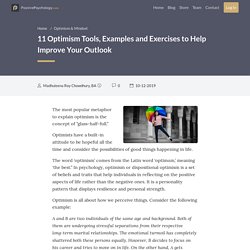
Optimists have a built-in attitude to be hopeful all the time and consider the possibilities of good things happening in life. The word ‘optimism’ comes from the Latin word ‘optimum,’ meaning ‘the best.” In psychology, optimism or dispositional optimism is a set of beliefs and traits that help individuals in reflecting on the positive aspects of life rather than the negative ones. It is a personality pattern that displays resilience and personal strength. Optimism is all about how we perceive things. A and B are two individuals of the same age and background.
Clearly, in this instance, B is more optimistic than A, even though they are undergoing similar circumstances in life. Inculcating optimism, no matter how difficult it may seem, is a prime focus of contemporary person-centered psychotherapy. Optimism Study Gives Optimists More Reason to Be Optimistic. Women and men with greater optimism tend to live longer than their pessimistic peers, on average, according to a decades-long study published yesterday.
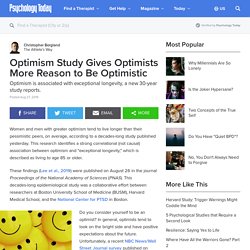
This research identifies a strong correlational (not causal) association between optimism and "exceptional longevity," which is described as living to age 85 or older. article continues after advertisement These findings (Lee et al., 2019) were published on August 26 in the journal Proceedings of the National Academy of Sciences (PNAS). This decades-long epidemiological study was a collaborative effort between researchers at Boston University School of Medicine (BUSM), Harvard Medical School, and the National Center for PTSD in Boston.
What Are Attributional and Explanatory Styles in Psychology? What is the Life Orientation Test and How to Use It? (LOT-R) Optimism is a mental attitude tied in with the belief that all our actions will have a desirable outcome.
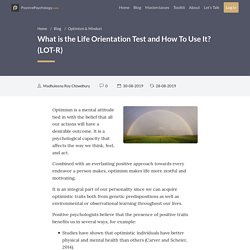
It is a psychological capacity that affects the way we think, feel, and act. Combined with an everlasting positive approach towards every endeavor a person makes, optimism makes life more zestful and motivating. It is an integral part of our personality since we can acquire optimistic traits both from genetic predispositions as well as environmental or observational learning throughout our lives. Positive psychologists believe that the presence of positive traits benefits us in several ways, for example: Numerous pieces of evidence make it clear how optimism and positive thinking can help us reach our goals in life. Although some psychologists differ on what factors are responsible for influencing levels of optimism in different persons at different times, they do agree on the fact that being optimistic is an essential requisite for an overall self-confident approach in life.
What Does it Mean to Have a Sense of Coherence? (+Scale) According to Harvard Health, the Sense of Coherence Scale (SOC) is a scale that assesses how people view life and a scale that seeks to identify how people might use their resources to overcome resistance and maintain and develop their health.
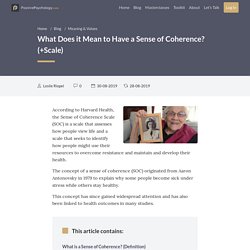
The concept of a sense of coherence (SOC) originated from Aaron Antonovsky in 1979 to explain why some people become sick under stress while others stay healthy. This concept has since gained widespread attention and has also been linked to health outcomes in many studies. 5 Quality of Life Questionnaires and Assessments. How do you measure quality of life?
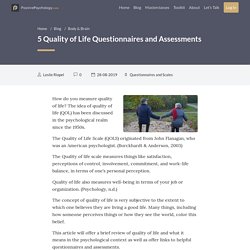
The idea of quality of life (QOL) has been discussed in the psychological realm since the 1950s. The Quality of Life Scale (QOLS) originated from John Flanagan, who was an American psychologist. (Burckhardt & Anderson, 2003) The Quality of life scale measures things like satisfaction, perceptions of control, involvement, commitment, and work-life balance, in terms of one’s personal perception. Quality of life also measures well-being in terms of your job or organization. The concept of quality of life is very subjective to the extent to which one believes they are living a good life.
Hope. Positive Attitude. Life Satisfaction. Prudence. Strategic Imagination. Skeptical Movement.
Optimism. HERO Effect. Cognitive Restructuring. Good Health.